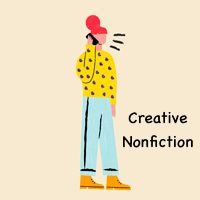the boy says
"where is
your culture?"
like I have
just
forgotten
to put it
on
...
[+]
After we’d come back from the store, my roommates each reluctantly headed back to their rooms, to the homework they’d left undone. I lingered in the living room and curled up on the couch, clutching a plastic bag containing two new pairs of jeans to my chest. As I felt the warmth of fresh tears rolling down my cheeks and nose, the sizes on the tags screamed at me. I had starved three more inches off of my body, and I cursed myself that the solution to drowning in the jeans I already owned was not to correct a rapidly developing eating disorder, but to simply buy smaller jeans.
How did I let it get this bad?
The question raged through me as I cried myself through the dinner hour. Out of fear, I force-fed myself half a bowl of leftover spaghetti.
It was painful at first, but an obsessiveness forced me to stop eating. The unnerving part was how much I liked it. I liked the way I saved money when I went to the grocery store, and I liked the game I played with the calendar to see how many weeks I could make it between grocery trips. I liked what people said when I started thinning out, and I liked the feeling of my clothes becoming gradually looser. I liked the hungry feeling that gnawed at my stomach and felt like power and control.
Just as my obsession with food was developing, I moved to Southeastern Asia. I lived there for a year and a half, almost completely cut off from my family and friends. Standing just shy of six feet tall, all hips and thighs and claves and ankles, I was an anomaly there. Every day I was painfully aware of how I looked standing among a sea of five-foot-nothing slender bodies.
Believe it or not, I made it nine whole months of almost-surviving—of telling myself that the way I lived before Asia wasn’t healthy, that it couldn’t be a sustainable lifestyle, and didn’t I love Thai food anyway?
Yes, a voice inside my mind answered, but not more than you hate your stomach.
I can’t quite describe what it’s like to have a monster in your head—to feel powerless against your own thoughts, to be demeaned, belittled, bullied from the inside out. My mind told me to hate my body, and I did, not because it made sense but because I was filled with the shame and guilt of sideways looks and whispered comments as I walked down a school hallway, filled with tainted memories of images where I am more stomach than child sitting on Santa’s lap.
I was caught in a trap, and eventually, I began calculating. I knew it wasn’t healthy; it wasn’t normal. Normal people didn’t obsess over their meal schedule. They didn’t have a list of rules waiting for them at home, taped to their study room mirror so that every time they saw themselves they’d be reminded why they weren’t enough. Normal people didn’t turn habits into points and keep a running tally in their journal.
I knew it wasn’t normal. What I didn’t know was how to stop.
When I returned home, my parents planned a family getaway. We flew out to a beach house in the East and spent dawn till dusk playing in the ocean, drinking in the scent of salty breezes, and relishing the texture of sand beneath our toes. It was a week of relaxation, and we all needed it.
I remember one particular afternoon when we’d all decided to hold an informal lunch of ham sandwiches served at your laziest convenience. I made an open-faced ham and cheese—one piece of bread, a light slathering of mayonnaise, honeyed ham, and an ambitions slice of cheddar cheese. I tried so hard to eat it. Truly, I did. But just as I’d been discovering ever since moving back home, there were some things harder to adjust to than others. My body had started rejecting food. Not all food, of course, but what little I gave it had to be well chosen. After my time in Asia, I could no longer stomach breads, heavy pastas, and almost all dairy products, milk and cheese being the worst offenders.
As I put the half-finished half-sandwich regretfully back down on my plate, my brother-in-law gave me a pitying look. “It must be hard to adjust back to eating like this again,” he said, sympathy dripping from his voice.
If only he knew.
If only someone knew.
As I sat alone in the living room, clutching the condemning jeans to my chest, I was overcome with a tidal wave of fear. Irrational thoughts flooded my mind. What happens when I fill my clothes again? Will I tell myself it’s because I’m too big for them? Will I have to starve myself until even the new jeans sag off? I’ve punched three new holes in my belt already—how many more will I have to add this time around? When will it be enough?
The last question rankled.
I knew I had to do something. I remembered the week previous when I finally broke my silence and painfully admitted to my fiancé that for the better part of the last three years, I’d been fighting against anorexia. He thanked me for telling him, even if he had to drag it out of me.
“What was I supposed to do?” I exclaimed. “I’ve never told anyone before.”
“Oh,” he said, and if heartbreak could be a sound, that was it. “I didn’t know that.”
I worried, even a week later, curled up on a living room couch, if I had broken something inside him with my confession. He said we’d get through this together. I opened the shopping bag and stared at the blue denim lying lifelessly inside.
It took me twenty minutes to pick up the phone. Then, slowly, I dialed his number.



